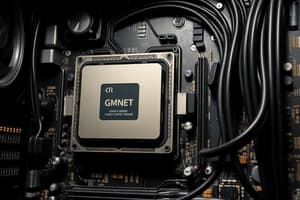Podcast
Questions and Answers
What is the primary difference between GPUs and CPUs in terms of their architecture?
What is the primary difference between GPUs and CPUs in terms of their architecture?
- GPUs are designed for serial processing, while CPUs are designed for parallel processing.
- GPUs use branch prediction, while CPUs do not.
- GPUs have deeper pipelines for code optimization, while CPUs have simpler pipelines.
- GPUs have more cores for parallel processing, while CPUs have fewer cores for more complex operations. (correct)
What type of memory technology is used in DRAM chips?
What type of memory technology is used in DRAM chips?
- Solid-state storage
- 3D NAND arrays
- 1T1C memory cells in 2D arrays (correct)
- Magnetic disks
What is the primary advantage of SSDs over hard disk drives (HDDs)?
What is the primary advantage of SSDs over hard disk drives (HDDs)?
- SSDs have faster read/write speeds. (correct)
- SSDs have higher storage capacity.
- SSDs are more reliable than HDDs.
- SSDs are more cost-effective per terabyte.
Which of the following is NOT a component typically found inside a computer mouse?
Which of the following is NOT a component typically found inside a computer mouse?
What is the primary function of the plastic traces in a basic keyboard?
What is the primary function of the plastic traces in a basic keyboard?
Which of the following is the primary reason why SSDs have slower read/write speeds compared to DRAM?
Which of the following is the primary reason why SSDs have slower read/write speeds compared to DRAM?
What is highlighted as the brain of the computer in the desktop computer dissection video?
What is highlighted as the brain of the computer in the desktop computer dissection video?
How many cores does the integrated circuit of the CPU contain in the desktop computer dissection video?
How many cores does the integrated circuit of the CPU contain in the desktop computer dissection video?
What is used to regulate voltage from the power supply to the CPU near the CPU in the desktop computer dissection?
What is used to regulate voltage from the power supply to the CPU near the CPU in the desktop computer dissection?
Which component in the desktop computer system requires a CPU cooler with liquid circulation and fans for heat dissipation?
Which component in the desktop computer system requires a CPU cooler with liquid circulation and fans for heat dissipation?
What is a crucial component connecting to the CPU on the large printed circuit board known as the motherboard?
What is a crucial component connecting to the CPU on the large printed circuit board known as the motherboard?
Which of these is responsible for managing data flow within the PC in the desktop computer dissection video?
Which of these is responsible for managing data flow within the PC in the desktop computer dissection video?
Flashcards are hidden until you start studying
Study Notes
- The video is a desktop computer dissection using 3D animation to explore the internal hardware components of a typical desktop computer.
- The Central Processing Unit (CPU) is highlighted as the brain of the computer, consisting of an integrated circuit with 10 cores where programs and instructions are executed.
- The CPU contains approximately 8 to 10 billion transistors that work with multiple layers of metal wires and vias to execute billions of operations per second.
- Other components of the CPU include the shared L3 memory cache, integrated graphics processor, memory controller, and system agent for managing data flow within the PC.
- The motherboard is a large printed circuit board with various microchips, components, and connectors soldered to it, with the Chipset being a crucial component connecting to the CPU.
- The Voltage Regulator Module (VRM) near the CPU is used to regulate voltage from the power supply to the CPU, generating heat that requires heat sinks for cooling.
- The CPU consumes power equivalent to 16 LED bulbs, necessitating a CPU cooler with liquid circulation and fans for heat dissipation.
- The power supply in the computer distributes power throughout the system, with various components ensuring stable voltage output for different hardware components like SSDs and GPUs.- Integrated circuits consist of transistors at the bottom and multiple layers of metal wires above, manufactured in semiconductor fabrication plants.
- GPUs have thousands of cores for basic arithmetic, while CPUs have fewer cores for more complicated operations, with branch prediction and deep pipelines for code optimization.
- GPUs excel in parallel processing by distributing data across thousands of cores, unlike CPUs that handle arithmetic in smaller batches.
- DRAM chips store data temporarily using 1T1C memory cells in 2D arrays with limited storage capacity but quick access in nanoseconds.
- SSDs use 3D NAND arrays for permanent data storage, with multiple layers storing terabytes of data but slower read/write speeds compared to DRAM.
- Hard disk drives have a disk mounted to a spindle, with a read/write head accessing tracks on the disk, slower than SSDs but more cost-effective per terabyte.
- Inside a computer mouse, components include a scroll wheel, infrared light, image sensor, lenses, battery, and processor, each serving specific functions.
- A basic keyboard contains plastic traces for conducting electricity to keys, completing circuits when pressed and sensed by the processor.
Studying That Suits You
Use AI to generate personalized quizzes and flashcards to suit your learning preferences.




